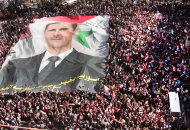

BEIRUT (AP) — Loud explosions rocked the Syrian capital Sunday, and activists said it was a rare attack on a government building, as the country's defiant president vowed to pursue his bloody crackdown on dissent.
Beyond reports of loud blasts at daybreak, details of the explosions could not be confirmed. The Free Syrian Army, a group of military defectors, claimed they hit the Damascus headquarters of the ruling Baath party with several rocket-propelled grenades.
The British-based Syrian Observatory for Human Rights said unknown gunmen on motorcycles threw first a stun grenade and then fired RPGs at the Baath party headquarters, hitting the outside wall of the building. Two other grenades missed the target, it said.
Syria has placed severe restrictions on the work of journalists in the country, making independent confirmation difficult. Foreign Minister Walid al-Moallem said the reports of an attack were "absolutely baseless." But at a news conference, he thanked a Syrian journalist for clarifying that the explosions heard in the area were the result of a stun grenade, indirectly acknowledging that some kind of attack had taken place.
Witnesses said the party headquarters appeared intact and reported no significant security deployment around it.
If true, the Damascus attack on the Baath Party's main building would signal a significant shift in the eight-month revolution against President Bashar Assad, bringing the violence that has hit much of the rest of the country to the heart of the Syrian capital, which has so far been relatively untouched.
In Cairo, the Arab League rejected Syrian amendments to a peace plan to end the crisis, saying the changes would alter the plan's essence. Last week the body reaffirmed its suspension of Syria and gave it three days to comply with the plan, which calls for the withdrawal of the regime's tanks from the streets, the release of political prisoners and a halt to attacks on civilians.
The 22-member organization did not give details of Syria's proposed amendments. It said in a statement Sunday that Damascus' proposals were unacceptable because they introduce "drastic changes" to the mandate of an observers' mission the league wants to dispatch to Syria to ensure the implementation of the peace plan.
Al-Moallem told reporters the proposed Arab League observers mission placed "impossible conditions" and gave excessive authority to the observers in a way that violated Syria's sovereignty. He denied Damascus sought to restrict the observers' movement within the country but said Syria wanted to be informed of the groups' travels in order to offer security protection.
"The observers, if they come, will have freedom of movement," he said. "We have nothing to hide. They should see the killings, the massacres and the crimes being carried out against our people and security forces."
An Arab League official, speaking on condition of anonymity because he was not authorized to brief reporters, said the Syrian government was required to implement the peace plan in its entirety.
Arab League deputy secretary-general Ahmed bin Heli said Arab foreign ministers will discuss developments in Syria at their regular meeting on Thursday.
In an interview with Britain's Sunday Times newspaper, Assad vowed to crush "militants" who he says are massacring Syrians.
"The role of the government is to fight those militants in order to restore stability and to protect civilians," he said, repeating warnings that foreign military intervention in Syria would "shake the entire Middle East."
On Sunday, activist groups said at least three people were killed by security forces — two in the flashpoint central city of Homs and one in northern Syria.
Syria's uprising against Assad, although largely peaceful, has grown more violent and militarized in recent weeks, as frustrated protesters see the limits of peaceful action. Army dissidents who sided with the protests have also grown bolder, fighting back against regime forces and even attacking military bases, raising fears of a civil war in Syria.
The U.N. says more than 3,500 people in Syria have been killed in the crackdown since the start of the uprising in mid-March. Assad, in the interview, said more than 800 Syrian officers and security forces were killed.
Assad told the newspaper he feels "pain and sorrow" for the bloodshed but insisted the solution was to eliminate the militants he blamed for much of the violence. The Assad regime maintains the protesters are following a foreign agenda to isolate and weaken Syria.
Assad, who took over from his late father, Hafez, in 2000, said there would be parliamentary elections in February or March, after which there would be a new government and new constitution.
"That constitution will set the basis of how to elect a president ... the ballot box should decide who should be president."



